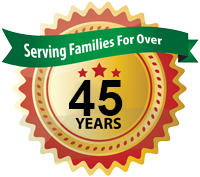Hurricane Information
You Can Count On Us!
We take hurricane preparedness seriously! Experience with hurricanes Andrew, Tina, and Wilma, has taught us that you can never prepare too much!
We pay close attention to detail and our system was put to good test during Hurricane Wilma. In fact, even without electricity for over 22 days, we never closed our doors. Our phones were always working. We never missed a delivery. We constantly reviewed and flagged all those patients who needed special services. And, we answered calls to those healthcare professionals outside our referral base to help others in need. That service proves our commitment to educating you on Disaster Planning.
We want to remind families that incontinence products are just as important as other emergency needs when experiencing a hurricane or loss of electricity. Stores remain closed and shopping shelves go dry. Products are sold out. So we look at all these situations and prepare. We start this process early each April to meet the needs of patients with essential life assist apparatus and those who will need disposable goods. Our Hurricane Program is registered in the State of Florida for all counties. This Comprehensive Emergency Management Plan (CEMP) requires us to identify and prepare for all types of emergencies.
Hurricane Season Begins June 1st through November 30th each year.
Overall care requires a circle of healthcare professionals who have your family member’s health in mind at all times…this is an important ingredient to the recipe of Excellence in Care.
Remember our values of care when choosing your next supplier.
And, Ask our Safety Director how we can help you. Call us today.
Evacuation Information
Evacuation Plans
When community evacuations become necessary, local officials provide information to the public through the media. In some circumstances, other warning methods, such as sirens or telephone calls, also are used. Additionally, there may be circumstances under which you and your family feel threatened or endangered and you need to leave your home, school, or workplace to avoid these situations.
The amount of time you have to leave will depend on the hazard. If the event is a weather condition, such as a hurricane that can be monitored, you might have a day or two to get ready. However, many disasters allow no time for people to gather even the most basic necessities, which is why planning ahead is essential.
Evacuation: More Common than You Realize
Evacuations are more common than many people realize. Hundreds of times each year, transportation and industrial accidents release harmful substances, forcing thousands of people to leave their homes. Fires and floods cause evacuations even more frequently. Almost every year, people along the Gulf and Atlantic coasts evacuate in the face of approaching hurricanes. Ask local authorities about emergency evacuation routes and see if maps may are available with evacuation routes marked.
Evacuation Guidelines
| Always: | If time permits: |
| Keep a full tank of gas in your car if an evacuation seems likely. Gas stations may be closed during emergencies and unable to pump gas during power outages. Plan to take one car per family to reduce congestion and delay. | Gather your disaster supplies kit. |
| Make transportation arrangements with friends or your local government if you do not own a car. | Wear sturdy shoes and clothing that provides some protection, such as long pants, long-sleeved shirts, and a cap. |
| Listen to a battery-powered radio and follow local evacuation instructions. | Secure your home:
Close and lock doors and windows. Unplug electrical equipment, such as radios and televisions, and small appliances, such as toasters and microwaves. Leave freezers and refrigerators plugged in unless there is a risk of flooding. |
| Gather your family and go if you are instructed to evacuate immediately. | Let others know where you are going. |
| Leave early enough to avoid being trapped by severe weather. | |
| Follow recommended evacuation routes. Do not take shortcuts; they may be blocked. | Make sure you know your evacuation route. Check with your local government to update the information. |
| Be alert for washed-out roads and bridges. Do not drive into flooded areas. | |
| Stay away from downed power lines. |



